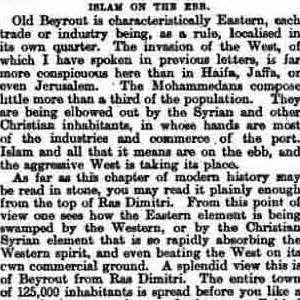Short Teaching Module: The Forgotten Beirut-based Companies in the Global History of Capitalism
Overview
The history of capitalism has traditionally centered Europe, but the reality is that globalization and exchange has been shaped by actors from around the world. This teaching module explores the history of Levantine companies whose business practices led to the accumulation of large amounts of capital in the 19th century and whose actions and finances were an important influence on the history global capitalism.
Essay
When I meet my first-year students in International Studies or Middle East history courses, they often come to my class with very specific ideas about the history of capitalism. In high school, they had learned the history of the cotton gin and had studied the Industrial Revolution as a British phenomenon. With these facts in hand, they have already long concluded that capitalism or economic prosperity did not (or does not) exist in the Middle East.
Over the past five years, global enquires have begun to undercut myths about Protestantism and whiteness as the universal American historical experience. For instance, newly discovered diaries of enslaved Muslims in the American South reveal that enslaved West Africans introduced Islam to the United States in the nineteenth century.1 New sources on the lynching of Lebanese migrants in 1920s Florida complicate examinations of racial identity and racial violence in the United States. 2 Similarly, new business archives of Beirut-based companies illustrate that modern practices of global finance over the long nineteenth century were shaped through exchange and competition between Western Europe, the United States, and indeed non-Western actors.
It’s not difficult to understand where such Eurocentric understandings of capitalism come from. For a long time, many historians of capitalism have repeated orientalist tropes familiar from the 19th century. They reason that capitalism is Western and that capitalism is impeded by the laws and practices of Islam.3 This eurocentrism is even present in the very names that historians and journalists give non-Western companies. They describe business families in the Middle East, China, and Russia by their Western European referents; they are the “Russian Rothschilds” or the “Rothschilds of the East.”4 Yet, these non-Western European companies were not Rothschilds. In the case of the Beirutis, they were Sursuqs, Bustruses, Debbases, Tueini, Trads, etc. In fact, the size of the Levantine5 companies’ accounts with London’s Rothschild bank permitted them to negotiate business and financial practices with the Rothschilds and other major companies, as equals.6 These practices make up what scholars often refer to as the broader rubric of capitalism in nineteenth century globalization.
Levantine Companies, Futures, and Modern Finance
The Levantine family companies in Beirut first accumulated large amounts of capital in the mid nineteenth century. They did so through the production, manufacture, and sale of silk from Mount Lebanon. In the early 1860s, when silk from the region was at its peak, the Levantine firms built new silk factories, taking the number of Levantine-company-owned factories from thirty-seven in 1862 to forty-seven in 1867.7 At the same time the companies began to vertically integrate their businesses and diversify their portfolios.
One of the Levantine companies’ earliest relationships was with the London firm Lascaridi & Co., created under the direction of George Peter (G. P.) Lascaridi. Through this firm, the brothers acted as merchants, insurance and discount agents, dealers, and chapmen.8 In addition to their many local and global business pursuits, members of the Lascaridi family invested in the purchase and operation of steamers between London and the Levant and other regions of Europe and the Ottoman Empire, establishing the Greek and Oriental Steam Navigation Company in 1857.9 In a short space of time, these steamers were carrying a significant portion of global trade. By the early 1860s, the companies’ ships carried approximately 7,000 tons per month of export trade to Levantine coastal ports, in addition to a bulk of trade with Istanbul and the Black Sea region. 10
A major part of the Greek-Orthodox families’ success was their participation in specific, still nascent forms of large-scale, speculative trade— what was later institutionalized as the “futures” market for cotton and other goods. The exchange of bills of lading for products like cotton prior to the arrival of cargo to ports was a practice that scholars trace to the early nineteenth century.11 The Greek-Orthodox and Levantine companies appear to have been at the forefront of the rapid growth of speculative trade. According to the observations of the British journalist Malcolm Meason, the firms were at the forefront of shaping techniques of capital accumulation globally:
“For a purely English house to carry on transactions of such magnitude would have been a simple impossibility … it was not until the Greeks— or rather what is called the Levant trade— took to trafficking in bills which had really nothing whatever behind them in the way of money or capital, that a regular and large profit began to be made out of this kind of paper.”12
From the mid-nineteenth into the early twentieth century, members of the Levantine companies telegraphed bills of lading for several different raw goods to their partners in Europe. These partners sold the goods in whichever markets would give them the best price, before they reached English, French, or other European shores.13 The profits that the trading houses made from the anticipated sales could then be used to purchase textiles or other manufactured products for the return cargo.
Despite the occasional damaged shipment or diverted ship, the Levantine businessmen’s early partnerships with the Greek firms of Spartali & Lascaridi brought in well over £100,000 in 1857 alone due to their risky but profitable futures trade. 15 In the late 1850s, the Greek businessmen Constantine Peter Lascaridi, for example, became a major shareholder and decision-maker on the board of directors for The Atlantic Royal Mail Steam Navigation Company, which was a partner of the American Express Company in New York.16 In the growing cosmopolitan port city of mid-nineteenth-century Beirut, twenty-nine different Levantine merchants with ties to the Sursuq extended family served the four biggest Greek trading houses.17 By 1866, the Levantine businessfa milies had added to their 1858 London branch by building offices in the major commercial centers of Paris and Liverpool.18 As global trade increased, they had become major investors in European stock markets and established partners in British-based companies. By 1881, these companies could influence the stock markets with one decision. The global financial market was tied to their actions. 19
Conclusion
While historians have challenged narratives of white, protestant superiority, high school history textbooks have not always kept pace with that change. This makes history like this especially important. The history of the Levantine companies’ participation in nineteenth century globalization in particular suggests that cooperation and competition on multiple scales shaped the modern world. My belief is that such case studies should be an integral part of the history of capitalism so that students arrive at college ready to dig deeper. . This particular education is necessary not least because non-White, non-Protestant, and non-Western subjects continue to shape their world today.
1 Michael A. Gomez, “Muslims in Early America,” The Journal of Southern History, 60:4 (Nov. 1994), 671-710.
2https://lebanesestudies.ncsu.edu/projects/romey.php
3Timur Kuran, The Long Divergence: How Islamic Law Held Back the Middle East (Princeton: Princeton University Press, 2011).
4Abigail Green “Insider-Outsiders,” London Review of Books, 43:4 (Feb. 2021) https://www.lrb.co.uk/the-paper/v43/n04/abigail-green/insider-outsiders.
5Levantine is the adjective referring to the region of the Levant, which is present day Jordan, Palestine/Israel, Lebanon, and Syria.
6Rothschild Bank Archive XI/28/196 Letter from Joseph Sursuq & Sons to MM Rothschild & Sons, Beirut, 18 Oct. 1892; Letter from Antoine Gazel to MM Rothschild & Sons, Cairo, 11 Jan. 1917; Letter from Antoine Gazel (lawyer) to MM Rothschild & Sons, Cairo, 22 Jan. 1927.
7 Roger Owen, The Middle East in the World Economy, 1800–1914 (London: I. B. Tauris, 2002) ,157.
8Gelina Harlaftis, A History of Greek-Owned Shipping: The Making of an International Tramp Fleet, 1830 to the Present Day (New York: Routledge, 2005), 62.
9 Ibid.
10Ibid., 42.
11Sven Beckert, Empire of Cotton: A Global History (New York: Random House, 2014), 210–211.
12Malcolm Ronald Laing Meason, The Bubbles of Finance: Joint Stock Companies, Promoting of Companies, Modern Commerce, Money Lending, and Life Insuring (London: S. Low, Son, and Marston, 1865),163. This form of futures trade is analogous to the post-1970s financialization of capitalism—trading in derivatives, not the actual commodity or stock share.
13See, for instance, TNA J55/4/66, “Bustrus V. White,” High Court of Justice, London: Queens Bench Division, 1876.
14The companies received a discount limit from the Bank of England of 30,000£. Stanley Chapman, Merchant Enterprise in Britain: From the Industrial Revolution to World War I (Cambridge: Cambridge University Press, 1992), 158.
15The Levantine families introduced other major European companies to the futures trade. See, for example, TNA J55/4/66, “Bustrus V. White.”
16“The Atlantic Royal Steam Navigation Company Ltd.,” Economist, 6 Oct. 1858.
17Chapman, Merchant Enterprise in Britain, 158.
18LMA CLC/B/192/DC/019/MS31522/80, “Beirut: Report on Merchants in Royal and Sun Insurance Alliance Group, Foreign Agency Memorandum,” n.d.
19“The Money Market,” London Standard, 31 Oct. 1881.
Primary Sources
Credits
Kristen Alff is an Assistant Professor of History and International Studies at North Carolina State University. Before earning her PhD from Stanford University, Alff received a BS from Boston University School of Education and taught English, Humanities, and Communications for 6 years at the high school level. Kristen Alff is currently working on a manuscript detailing the business practices of Levantine joint-stock companies and changes in global capitalism before and during World War I.


